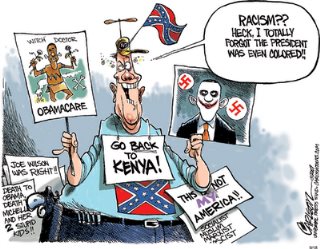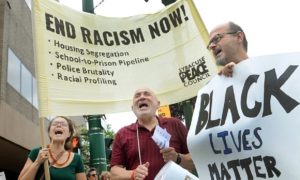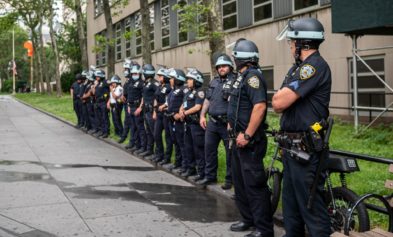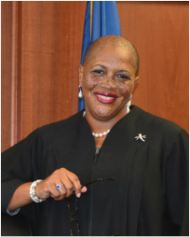
The W.K. Kellogg Foundation, in conjunction with the Northeastern University School of Journalism, just issued a report with public opinion polling data on racism. The authors claim that the polling confirms that racism remains a reality in America, and a majority of people across racial lines want to eliminate it and believe it will happen. The report found a particularly positive shift in white attitudes.
Among its findings, the report revealed that last year, most Americans — including 53 percent of whites, up from 39 percent the previous year — believe more must be done to eliminate racism. In addition, 70 percent of Latinos (up from 54 percent) and 86 percent of Blacks agree with that assessment. The attitudes of Latinos and Blacks closely mirror each other in the polling, with the exception of certain areas such as criminal justice.
With regard to criminal justice, a growing number of people understand that the legal system is unfair towards African-Americans. Last year, 44 percent of whites said the criminal justice system was rigged against Black people, up from 15 percent in 1995, and 32 percent in 2000. Further, many people are pessimistic about race relations in America, the most in two decades, a reality which is likely driven by police killings of unarmed people of color. Moreover, since the election of President Obama, there has been an overall decline in people who say race relations are “very or fairly good.” Despite this, most Americans think race relations are good in their own communities, which may reflect the racial segregation of many communities in the U.S. In addition, whites (59 percent) and Hispanics (64 percent) have been more optimistic than Blacks (4 percent) that someday the nation will eradicate racism.

White people participate in a march on Tuesday in Syracuse, New York, to protest against racism and the Charleston church shooting in which nine black people died. Photograph: The Post-Standard /Landov / Barc
In light of recent events in South Carolina and the Charleston massacre, the polling also found that across every demographic of race, gender, region and political party affiliation, there is widespread support for removing the Confederate flag. Meanwhile, most Americans — three quarters of whites and Hispanics, but less than half of Blacks — believe people are treated equally regardless of race in jobs, education and housing.
According to the study, there is a desire to have a national dialogue on racism, including a comfort level among many Americans with having interracial conversations about race.
“The white shift in opinion on racism is a very significant development,” said Jonathan Kaufman, chair of the Northeastern University School of Journalism.
“Look at the issues that have dominated the news — Ferguson, police treatment of African-Americans, immigration, treatment of Muslims, the Black Lives Matter movement. In years past, like the 1960s and 1970s, those issues angered many whites and fed a white backlash. The feeling is very different today,” Kaufman said.
“It feels like whites are recognizing the pain and injustices that many people of color are talking about. They may not know or agree on the solutions, but they want to find a way to address them,” he added. “It can be the start of finding comprehensive solutions that improve life outcomes for people of color.”
This news comes as the W.K. Kellogg Foundation announced the launch of a Truth, Racial Healing and Transformation process in conjunction with a coalition of 70 academic, corporate, civic, entertainment, religious and social justice leaders. The $35 million initiative will assist communities in embracing racial healing and eliminating conscious and unconscious bias. And the commission is based on other efforts undertaken in post-apartheid South Africa and in certain parts of the U.S. Over the past nine years, the foundation has funded over $200 million in grants to organizations to address racial division and structural bias.
Have we reached a crossroads in race relations and racism in the U.S.? There are many questions in need of answers. If and when America heals itself and comes to terms with the past and current sins of white folk, what will the process of change look like, and what path will be taken? Will there be a focus on restorative justice, on bringing together the victims and the perpetrators of the crime and promoting dialogue? Will America finally take white domestic terrorism seriously? Will anyone be punished, as South Africa now hopes to criminalize “racial bigotry” or “glorifying” apartheid, as Germany punishes denial of the Jewish Holocaust and the glorification of Nazi Germany? Moreover, will reparations for slavery become a part of the discussion, as it must?
In other words, are we looking at a tweaking around the edges, or an effort to fundamentally change the status quo of deeply entrenched white supremacy and white-skin privilege in the land of the free? Only time will tell.


